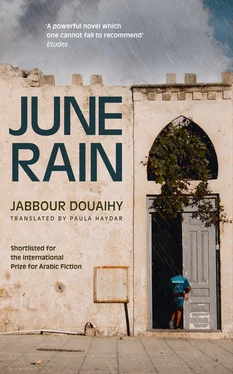They took them to the almond grove. The pits had already been dug. One straight row, as if they’d been dug by an expert at planting olive trees and orange trees standing like a line of soldiers. Someone had got up early to dig up the ground and prepare it to receive them. One hole for each one, then the dirt poured on top and that was it. They are still there to this day, on land owned by the monastery. They selected this site as their burial ground because the town cemetery in the Rami neighbourhood would be impossible for them to reach to pay their respects. And even if they could get to it, they would never leave their dead there.
They brought Kamileh back to her house on foot. On the way, she’d walk a little and then stop. Muntaha braced her. She’d stand in front of one of the houses, call to the people who lived there, and tell them that Yusef was gone and wasn’t coming back. No one came outside to console her. She’d resume her journey and then stop all over again. ‘Yusef is gone,’ she’d say, addressing some woman standing out on her balcony watching the people on their way back from the funeral. The woman on the balcony would cover her face with a white kerchief, weeping or wanting to give the impression she was weeping. Finally Kamileh made it to her house. They took her inside to lie down and rest.
‘No, not the bedroom,’ she erupted, like a mad woman. ‘I will never go back in there after today. Get me out of here. Get me out…’ They took her out to the balcony and let her stretch out on the bench. She laid her head near the dahlias and her mother sat down beside her.
A flock of swallows swooped down onto the balcony. Three black birds with their little outspread wings traversed the nearby space and glided over the people’s heads.
Swallows in season.
That was Monday, 18 June 1957, at approximately seven o’clock in the evening.
On a night close to that time, possibly a few days before or afterwards, another lady sat on another balcony that was also adorned with flowers and plants but which overlooked the Mediterranean Sea from a nearby elevation. The lady’s name was Laurice, or at least that’s the name she signed to her poetic writings, which she published soon after under the title Captain of the Wind. In the picture of her on the back cover of her poetry collection she’s wearing a white dress and a straw hat and is smiling coyly. In one of her poems she says, ‘It is difficult for me to be away from you… It is difficult for me to live… The land of mulberry trees and grapes… The land of secret springs… Images of God and a happy valley… After my death I will go searching for you… In the poor man’s bag is a little soil and a little water… The bread of promise… And it will be said: that woman in the distance has no shadow anywhere. My ancestors lived in the wastelands and the sand dunes… They went and came with the sand and the wind… They hunted gazelles that looked like women and waited at the doors of their houses until the end of time…’ She was said to have eventually married an Italian diplomat in Damascus and spent the rest of her days between Rome and Venice.
Kamileh relaxed a little, as if forcing her eyes shut against her will.
Kamileh’s mother pulled Muntaha aside, away from some of the neighbours who had come to the house. She repeated her request. ‘Go to Fuad and Butros al-Rami…’
‘Today?’
‘In an hour. When it gets dark. Go home, rest a little, change your clothes and come back.’
‘Oh God!’
‘They sent me some news,’ Kamileh’s mother said. She didn’t mention with whom or how. ‘They want to come to the house to offer their condolences to Kamileh. Yusef al-Kfoury was like a brother to them and they don’t want to delay in paying their respects to his wife.’
Muntaha went home, but she wasn’t convinced she should do it. She hoped Kamileh’s mother would get preoccupied looking after her daughter and forget the whole thing. Muntaha’s mother was sitting with her relative the mute near the entrance to the house, as usual, carrying on a conversation. He made speedy signs with his hands while she went slowly, as if searching for her words with her hands, or like someone speaking a language not her own and hesitating before pronouncing each word. They got tired quickly. One or two sentences and then they would have to rest. Muntaha’s mother had been weeping along with the other neighbours, too. Her eyes were red. The mute didn’t cry for anyone. He was probably feeling sad in his heart, but he didn’t cry. He hadn’t gone eel fishing that day but he still smelled like the river. He was barefoot, as usual. The mute was the sturdiest one among them in the face of tragedy.
Muntaha asked her mother about Haifa Abu Draa. Her mother had gone to Haifa’s house while Muntaha was with Kamileh.
‘No one ever died over someone,’ her mother said, meaning that no one had ever died from sorrow over another’s death. She was a harsh one, her mother. ‘The unfortunate one is the one who goes,’ she added, meaning that when it came down to it, the true loser was the one who died.
The mute nodded his head in agreement. He couldn’t hear what the woman was saying since she wasn’t moving her hands as she spoke. He couldn’t hear anything at all, but perhaps he intuited what his relative would say in such critical circumstances. It was difficult to imagine how such adages could be said in sign language or in the language of the mute eel-fisherman. No wonder his conversation partner had to put forth so much effort choosing her hand signals.
The mute was smiling and nodding his head in agreement. An indication he understood.
Muntaha didn’t hear what her mother said. Her answer was always the same whenever she returned from a funeral: death is a woman’s pastime. She’d heard her father say that once.
Muntaha collapsed onto the bench. She knew the day wasn’t over yet. She didn’t change her dress, in defiance of Kamileh’s mother who had told her to do so.
In all that stress, she had had the nerve to tell her to put on a new dress.
Muntaha later said that she had a dream during those few minutes when she shut her eyes and rested her head on the end of the wooden bench. She could have slept standing up.
Soldiers. She dreamt of soldiers. An entire platoon. A long line of soldiers dressed in blood-red, marching in a forest of tall trees. Poplar trees just like the ones planted along the two sides of the river road with their tops reaching up to the sky. The ground was wet from the rain of the night before and the ground was covered with yellow poplar leaves. Around each soldier’s neck was a cloth sack. Mizwid , they called it. They kept bread in it. They were all soldiers. No officers or sergeants among them.
They were the dead men. The ones who’d fallen and the ones who were going to fall.
The bread was the prayers that were chanted over each of their souls. They carried them around their necks to judgement day. Each would take the loaves out of his sack and present them to the Lord as He sat upon His throne.
He was the same Lord from the painting above the altar at the Church of Saint John the Baptist.
Kamileh’s mother, who didn’t knock at the door, because it was open, awakened Muntaha. She came right in to where Muntaha was in the sitting room.
She tugged at her shoulder. ‘Get up. We don’t have anyone besides you.’
Muntaha didn’t understand what she meant. She almost told Kamileh’s mother that she had two other daughters she could seek out for help. One of them was married and lived in one of the nearby villages; she could walk there if she wanted. The other one lived some distance away. Her husband didn’t like us and didn’t like our town, but she’d come from Beirut to attend her brother-in-law’s funeral. Her husband didn’t accompany her and made her go back in a hurry. Kamileh’s mother sent her daughters back to their families right away, out of fear for them. Why didn’t she send one of them? Why didn’t she go herself?
Читать дальше












